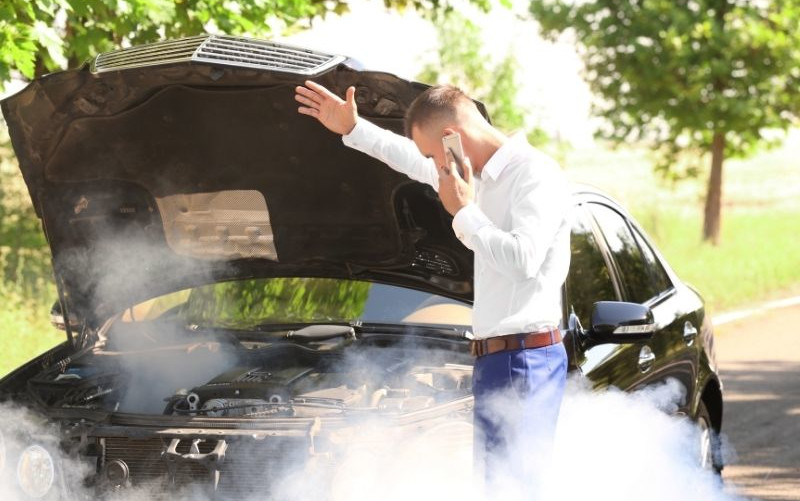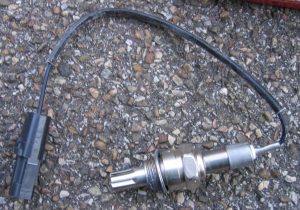
As an Amazon Associate, AutoPros earns commissions from qualifying purchases made through links in this post.
The temperature gauge has moved to the “hot” side but you’re only halfway to work, and now not sure if you’re going to make it. An overheating engine will lead to severe problems, so it’s important you pull over and check it out.
Don’t know much about cars? Now would be the time to call someone who can help you get to work, so you can get your car towed or have a mobile mechanic take a look at it.
Checking for Low Coolant and Leaks
It’s circulating coolant that keeps your engine from overheating, so this is the first thing you want to look at. Check for leaks on the ground, which will most likely be from the radiator or a coolant hose. Check your coolant reservoir, is it low?
Make sure to put in coolant, some people just use straight water and wonder why their engine and radiator are clogged with rust. A quality antifreeze/water mix can be purchased at Amazon or any local auto parts store.
If you’re too low on coolant then your engine might overheat on a sunny day, and if you have a leak, then obviously you’re going to run out of coolant, even if you have to top it up everyday.
Low on coolant but don’t have a leak? It’s possible that it evaporated over time. However, if you’re extremely low and can’t find an external leak then you should contact a local mechanic.
Rust will clog up your radiator if you never use a proper coolant mix, and sometimes it’s not easy to spot a clogged radiator. There are products you can buy to flush your radiator, but we recommend taking it to a local shop before attempting this on your own.
Check the Water Pump
The water pump is responsible for circulating coolant and keeping your engine cool. Over time, the coolant can become dirty and buildup will clog the pump. It’s a common issue that most vehicles will go through as they get up there in miles.
You can check the water pump by looking for coolant (sometimes, pink crystalized powder looking stuff) by the water pump. It doesn’t always drip and make it to the floor, so when checking for coolant leaks make sure to check the water pump area at the front of your engine.
The pulley can also become loose or make a whining noise as it gets old, so run the engine for a few minutes and check for it. It might wobble way out of balance if its loose, although it’s not always easy to identify.
If your water pump is making noise, appears cracked or is simply not pumping at all, shop around for a new one. You can check out water pumps here on Amazon.
Thermostat Issues
A bad thermostat is another common reason why your car might be overheating. The thermostat in your car’s engine is similar to the one in your home, and you need it to regulate normal working engine temperatures.
The main symptom of a bad thermostat is easy to spot if you’re paying attention. When you start your car and it heats up quickly, in less than 15 minutes, it is most likely the thermostat.
Bad thermostats will stick, preventing the flow of new coolant into the engine. They’re located at the end of a hose going into your engine, and if the thermostat blocks new coolant from coming in, then your engine will overheat very quickly.
Fortunately, a thermostat is an affordable part for most cars and trucks and it’s a lot better than dealing with a bad water pump or blown head gasket.
Other Reasons Why Your Car Might Be Overheating..
There are many reasons why your car might be overheating, ranging from serious issues like a blown head gasket, to easy-to-fix things like being low on engine oil. It could also be a symptom of serious internal engine damage.
Having a blown head gasket is a serious issue — you can easily check it by using a block tester kit like this one. If you haven’t been redlining the engine often, and you haven’t allowed it to overheat for too long then serious engine damage is unlikely. It is usually just a blown head gasket.
For those of you who aren’t mechanics or have not worked on many vehicles, it might be worth your time and money to just pay a mechanic to handle your overheating engine problem. The actual reason why your car is overheating can be misdiagnosed rather easily if you’re not experienced.

Automotive professional with over two decades of experience working on vehicles. Started out at a tire shop, moved to a dealership and now writing about automotive topics full time. I love working on cars and helping car enthusiasts by writing about my experiences.







2 thoughts on “Reasons Your Car Might Be Overheating”
Comments are closed.